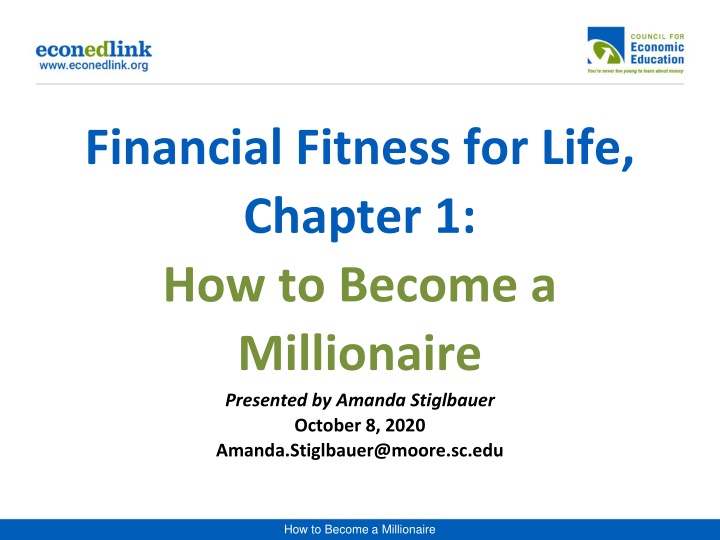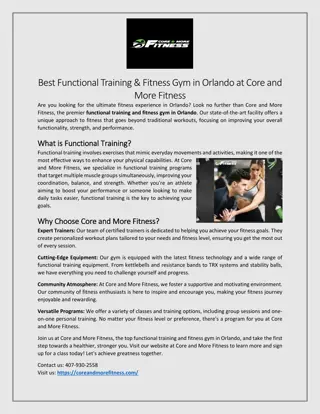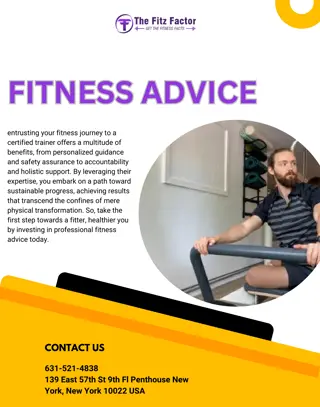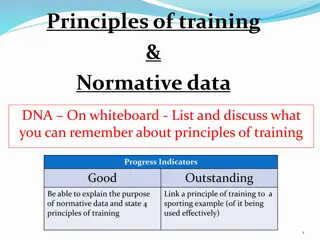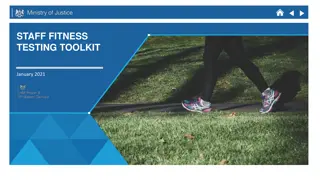Financial Fitness for Life: How to Become a Millionaire - Presented by Amanda Stiglbauer
Explore the journey to becoming a millionaire in "Financial Fitness for Life" Chapter 1, hosted by Amanda Stiglbauer. Discover the characteristics of millionaires, learn about successful financial decision-making, and delve into the importance of studying personal finance. Uncover insights on the richest people in the world today and examine national standards for financial literacy. Join the discussion on earning income and making informed education, job, and career decisions. Enhance your financial knowledge and set yourself up for financial success.
Download Presentation

Please find below an Image/Link to download the presentation.
The content on the website is provided AS IS for your information and personal use only. It may not be sold, licensed, or shared on other websites without obtaining consent from the author.If you encounter any issues during the download, it is possible that the publisher has removed the file from their server.
You are allowed to download the files provided on this website for personal or commercial use, subject to the condition that they are used lawfully. All files are the property of their respective owners.
The content on the website is provided AS IS for your information and personal use only. It may not be sold, licensed, or shared on other websites without obtaining consent from the author.
E N D
Presentation Transcript
Financial Fitness for Life, Chapter 1: How to Become a Millionaire Presented by Amanda Stiglbauer October 8, 2020 Amanda.Stiglbauer@moore.sc.edu How to Become a Millionaire
EconEdLink Membership You can now access CEE s professional development webinars directly on EconEdLink.org! To receive these new professional development benefits, become an EconEdLink member. As a member, you will now be able to: Automatically receive a professional development certificate via e-mail within 24 hours after viewing any webinar for a minimum of 45 minutes Register for upcoming webinars with a simple one-click process Easily download presentations, lesson plan materials and activities for each webinar Search and view all webinars at your convenience Save webinars to your EconEdLink dashboard for easy access to the event You may access our new Professional Development page here How to Become a Millionaire
Professional Development Certificate To earn your professional development certificate for this webinar, you must: Watch a minimum of 45-minutes and you will automatically receive a professional development certificate via e-mail within 24 hours. Accessing resources: You can now easily download presentations, lesson plan materials, and activities for each webinar from EconEdLink.org/professional-development/ How to Become a Millionaire
Agenda Collaboration Board Importance of studying Personal Finance Why Personal Finance? Kahoot & Lesson Characteristics of Millionaires Richest People in the World Today Mentimeter Characteristics of Millionaires Padlet - What was surprising and not surprising? Debrief and Wrap Up How to Become a Millionaire
Objectives I can . Describe the characteristics of millionaires and financially successful people. Examine successful financial decision making and apply those decisions to our lives in order to learn from them. How to Become a Millionaire
National Standards National Standards for Financial Literacy Standard 1 Earning Income, Grade 12, Benchmark 4 People can make more informed education, job, or career decisions by evaluating the benefits and costs of different choices How to Become a Millionaire
Collaboration Board Why is it important to study financial literacy? How to Become a Millionaire
Decisions Have Major Consequences on Future What occupation should I pursue? Should I go to college? Should I get a credit card? Are all credit cards alike? Should I start saving now or when I have a higher paying job? Should I invest in the stock market? What stocks and mutual funds should I invest in? How to Become a Millionaire
Making Good Decisions Getting a good education. Working hard, long, and smart. Learning to manage money and avoiding unnecessary debt. Saving early and often. Investing in the stock market long term. Gathering information and evaluating alternatives. How to Become a Millionaire
Rules of the Millionaire Game During the webinar, this game will be conducted as a Kahoot! Each correct answer is worth 5 points, while each incorrect answer costs you 5 points. Using your Double Down card will double correct/incorrect point values. You may only use your Double Down card 5 times. Any questions? How to Become a Millionaire
Statement #1 True or False Most millionaires are college graduates. How to Become a Millionaire
Statement #1 - Answer True 4 out of 5 millionaires are college graduates. 18% have Master s Degrees 8% have Law Degrees 6% have Medical Degrees 6% have Ph.D. s How to Become a Millionaire
Statement #2 True or False Most millionaires work fewer than 40 hours a week. How to Become a Millionaire
Statement #2 - Answer False About 2/3 of millionaires work 45-55 hours a week. How to Become a Millionaire
Statement #3 True or False More than half of all millionaires inherited their money. How to Become a Millionaire
Statement #3 - Answer False Only 19% of millionaires received any income or wealth of any kind from a trust fund or an estate. Fewer than 10% of millionaires inherited 10% or more of their wealth. How to Become a Millionaire
Statement #4 True or False Most millionaires attended private schools. How to Become a Millionaire
Statement #4 - Answer False Most millionaires attended public schools. Fewer than 20% of female millionaires attended private schools. How to Become a Millionaire
Statement #5 True or False Most millionaires drive expensive new cars. How to Become a Millionaire
Statement #5 - Answer False Most millionaires spend under $30,000 for a car. Only 23% of millionaires drive a current-year (new model) car. How to Become a Millionaire
Statement #6 True or False Most millionaires work in glamorous jobs, such as sports, entertainment, or high tech. How to Become a Millionaire
Statement #6 - Answer False Most millionaires work in ordinary industries and jobs. They become wealthy because they make good use of market opportunities. How to Become a Millionaire
Statement #7 True or False Most millionaires work for very large public companies. How to Become a Millionaire
Statement #7 - Answer False About 75% millionaires are self employed and consider themselves to be entrepreneurs. Most of the others are professionals, such as doctors, accountants, and lawyers. How to Become a Millionaire
Statement #8 True or False The most common way to become a millionaire is by winning the lottery. How to Become a Millionaire
Statement #8 - Answer False Few people get rich by luck. If you play the Power Ball lottery, the chances of winning are worse than one in 292 million. In contrast, if you live in the US, you have a one in 13,500 chance of being struck by lightning. Source: https://www.cbsnews.com/news/odds-of-winning-1-billion-mega-millions-and-powerball-1-in-88-quadrillion/ How to Become a Millionaire
Statement #9 True or False A college graduate earns almost double the annual income of a high school graduate. How to Become a Millionaire
Statement #9 - Answer True In 2018 the typical college graduate with a bachelor s degree earned a median weekly income of $1,232, while the median weekly income of the typical high school graduate was $736. People with advanced degrees (professional or master s degrees and above) earned a median weekly income of $1,487. Source: 2018 Bureau of Labor Statistics figures. How to Become a Millionaire
Statement #10 True or False If a high school graduate invests the difference between his or her earnings and the earnings of a high school dropout, from age 18 until age 67, at 8% interest, the high school graduate would have $5.5 million more than the high school dropout at age 67. How to Become a Millionaire
Statement #10 - Answer True This is a dramatic illustration of the value of a high school diploma. How to Become a Millionaire
Statement #11 True or False Investors who buy and hold stocks for the long term have better long-term stock returns than those who buy and sell stocks more frequently. How to Become a Millionaire
Statement #11 - Answer True Studies show that individuals who buy and hold stock versus turning stock over more quickly have greater net gains. The costs related to hyper-trading (buying and selling stock with great frequency) in terms of time and money can reduce the gains of even the luckiest investor. How to Become a Millionaire
Statement #12 True or False Millionaires tend to avoid investing in the stock market. How to Become a Millionaire
Statement #12 - Answer False In the long-run (starting in 1926 and including the Great Depression), the Standard & Poor s 500 Stock Index has increased at about a 10% compound annual rate of return, exceeding the return on any other investment. Of course, there is a risk. The stock market has down years, and there is no guarantee of a 10% return in the future, especially in the short run. In contrast, the long-term return on U.S. government securities during the same time period ranged from 5% to 6%. How to Become a Millionaire
Statement #12 Answer (continued) False Another way of looking at this is that $1.00 invested in the S&P 500 in 1925 was worth $5,317 by the end of 2014. One dollar invested in government bonds during the same time period was worth about $135 by the end of 2014. For most investors it probably paid to take the additional risk of buying stocks. How to Become a Millionaire
Statement #13 True or False At age 18, you decide not to drink soda from the vending machine and save $1.50 a day. You invest this $1.50 a day at 8% interest until you are 67. At age 67, your savings from not buying soda from the vending machine are almost $300,000. How to Become a Millionaire
Statement #13 - Answer True Because of the power of compound interest, small savings can make a difference. It pays to live below your means. Find a balance between spending now and saving for the future. How to Become a Millionaire
Statement #14 True or False If you save $2,000 a year from age 22 to age 65 at 8% interest, your savings will be more than $700,000 at age 65. How to Become a Millionaire
Statement #14 - Answer True Because of the power of compound interest, the earlier you begin saving the better. Regular saving will make you a millionaire, even if your salary is modest. How to Become a Millionaire
Statement #15 True or False Millionaires tend to be single rather than married. How to Become a Millionaire
Statement #15 - Answer False Most millionaires are married and stay married. How to Become a Millionaire
How Did You Do? A total of 100 points is a perfect score you might be a Millionaire of Tomorrow! To earn this score, you must have answered all the questions correctly and used the Double Down correctly on five of those questions. How to Become a Millionaire
Top 10 Richest People in the World How to Become a Millionaire
Mentimeter Characteristics of Millionaires How to Become a Millionaire
Padlet What is surprising and predictable about millionaires? How to Become a Millionaire
Rules for Improving Your Financial Life Get a good education. Work long, hard, and smart. Learn how to manage your money to avoid unwanted debt. Save early and often. Invest in common stocks for the long term. Gather information and compare the alternatives before making decisions. How to Become a Millionaire
Assessment Questions True/False 1. Most millionaires are college graduates. (True) 2. Most millionaires drive expensive new cars (False) 3. Millionaires refrain from investing in the stock market. (False) 4. Most millionaires attended private schools. (False) 5. Most millionaires work more than 40 hours per week. (True) How to Become a Millionaire
